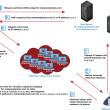Torrent websites use peer-to-peer technology. This involves users downloading files from dozens (or hundreds) of other users’ computers, instead of having a central file server or repository.
Torrenting has become very popular with the growth of the broadband Internet, which allows users to upload and download large files very quickly. However, torrents are often associated with piracy and illegal downloads. Internet Service Providers (ISPs) and copyright owners try to track the IP addresses of torrenters and hold them accountable for unlawful file sharing.
If you want to use torrent websites (trackers), but are worried about how to do it safely, then this article is for you.
Is torrenting legal?
Torrenting is a file-sharing technology. There are many legitimate ways to use torrents. For example, torrents are often used to distribute open-source software. The software code may weigh quite a few megabytes or even gigabytes and hosting the installation files could be expensive for developers. To avoid paying for file-hosting services, open-source software developers can use torrents to distribute their products. If you’re looking to use open-source software, you can use torrents to download the installation files from other users; this isn’t illegal.
See: Top The Pirate Bay Alternatives – Best Torrent Download Sites (2019)
That said, much of the content transmitted via torrent sites is pirated. In many countries, distributing such content is illegal because it breaks copyright laws. Thus, while the P2P technology itself doesn’t break laws, downloading certain content through torrents is illegal.
One reason copyright holders are successful is suing torrent users lies in the principle of BitTorrent technology. When you download files using torrents, your new files get downloaded in small portions from various other users, called seeders. The already downloaded pieces of the file become immediately available for downloading by other torrenters. So, technically, you are downloading and sharing files simultaneously.
Copyright holders care less about users who download the content; they care more about users who post or share content. When using torrents, you become a host of the files you download, making you a target of content owners.
It’s not difficult for copyright holders or ISPs to identify torrent users. This technology relies on specific protocols and ports. Torrent traffic can be detected based on these peculiarities.
To make downloading easier and faster, torrent technology users share their IP addresses with each other. If you don’t hide your IP address and use a standard Internet connection, your provider can see which files you’re downloading. If your ISP detects you’re using torrents and finds your IP address is providing access to copyright-protected content, they may inform copyright holders or contact you directly, potentially resulting in fines or even a lawsuit.
It’s not just ISPs that can view your activity. Media companies themselves or copyright trolls acting on their behalf may join torrenting sites simply to monitor activity. Plus, anyone who knows your IP address can use the IKnowWhatYouDownload website to see which torrent files have been downloaded and distributed from your IP address.
Security tips
If you really want to use torrents, there are ways to do it safely. Here are some tips for secure torrenting.
Use legal torrents
The first thing you can do to be safe while using torrent sites is to only download legal torrents. For example, it’s risky to download Hollywood films that were recently released on Blu-ray or DVD. Such content and IP addresses that illegally share it are closely monitored by the copyright holders.
To avoid any problems, you can use legal torrents. There are plenty of content types you can download legally. For example, independent movies, old content, and open-source software are often available for free. Below are several good sites where you can find legal torrents:
Use a privacy-focused torrent client
uTorrent is not the only torrent client out there, and there are many other options available, often offering unique features. Some torrent clients are focused on privacy and security and can encrypt your torrents and obfuscate traffic. Although these defenses aren’t always reliable, they can offer an additional layer of protection.
Use a proxy
To increase your anonymity, you can set up a proxy server and route all torrent traffic through a tunnel. This will hide your real IP address and replace it with another one. It’s a good idea to use an IP address checking service, such as What’sMyIP, to be sure your real IP address isn’t being leaked while downloading torrents.
Use a VPN
Today, using a Virtual Private Network (VPN) is considered to be the most reliable way to protect yourself while using torrents. VPNs mask the fact you connect to torrent sites and hide your real IP address. They encrypt all traffic before it leaves your computer and send it through a secondary server. This method makes it impossible for an ISP to know what websites you visit and what content you download.
Note that not every VPN is good for torrenting. For example, some VPNs have poor privacy policies and log user-identifying information such as your IP address. Some free VPNs don’t encrypt P2P traffic, so they are useless from a security standpoint when torrenting. Be sure to read user reviews and select only highly reliable and trustworthy VPN services for torrenting.
Use reputable torrent sites
Legal issues aren’t the only problems you may face while using torrents. When downloading a torrent file, you don’t know exactly what it consists of, and it could contain malware. For example, when the download is complete and you click on the file, it’s possible that your computer could be infected with a virus.
See: Top 10 VPN Services For 2019
To minimize such risks, it’s better to use reputable torrent sites. In addition, read the comments beneath the torrent description. Active users and administrators often use these sections to inform users about any problems with specific torrent files and recommend ways to resolve issues.
Did you enjoy reading this article? Kindly do like our page on Facebook and follow us on Twitter.









